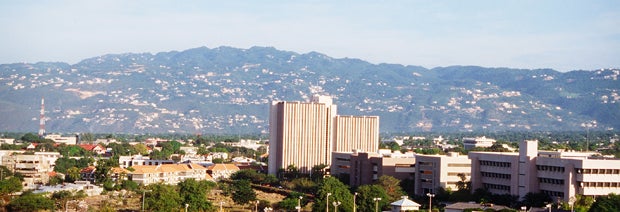It is human nature to aspire. We are never satisfied with our lives: we want a better paying job, a fitter body, a good looking partner, a healthy family and more of anything we think we need, including status and its trappings.
Aggregate these aspirations across a population of a country and national interests seem overwhelming—less debt, more growth, more jobs, less poverty, better roads, faster telecommunications, less red-tape, more business, higher international ranking , and on and on. In our economic model —more is always equated with better. How to get there?
In Jamaica of 2013, the economy is stuck in a morass of negative circumstances (economic and social) that mitigate against achieving the human aspirations of its citizens. However, because of aspiration, this situation need not stay stuck.
I recently learned on a visit to Guadalajara, Mexico a fact that in 1976—Kingston was its twin city. Now here is an opportunity to aspire. Today, Guadalajara is ranked the number one city in Latin America and the Caribbean for doing business. Apparently, policies (including NAFTA) helped to change the way in which investors responded to doing business there. It is now a major “Silicon valley” in the region, helped no doubt by the presence of an elite university, and a nurturing business environment. Kingston is now decades behind but some of the basic ingredients are here—policies to further liberalize the economy, reduce the debt overhang, lower interest rates and improve Jamaica’s competitiveness. The knowledge cluster of Utech and UWI is here. Jamaicans can respond as the Mexicans did by working hard and driving the process. It is human nature.
Therese Turner Jones is IDB’s Country Representative in Jamaica.


Inspiring!
Interesting article on Jamaica….and the potential for Kingston to join with its sister city in Mexico. Jamaica is my favorite island and tho I have spent more time in places outside Kingston, I think Kingston is the reason I like the island. The reason is hard to describe but the city and the island have a palpable heartbeat. People are always trying to scare you off about going to Kingston because of the crime rate there. Probably needs a marketing plan of its own…it is an exciting place and would benefit from an enhanced feeling of comfort. Some poor leadership and some horrible crimes continue to live on in people’s minds when they think about vacation travel and Jamaica. I hope it can get fixed and that the city thrives without taking on all the negative aspects of development.
Wilma,
Very much appreciate your comment. There is a lot to do in Jamaica, an understatement but we are getting on with it. Your positive voice is very much needed as consumer and investor confidence us weak. So thank you.